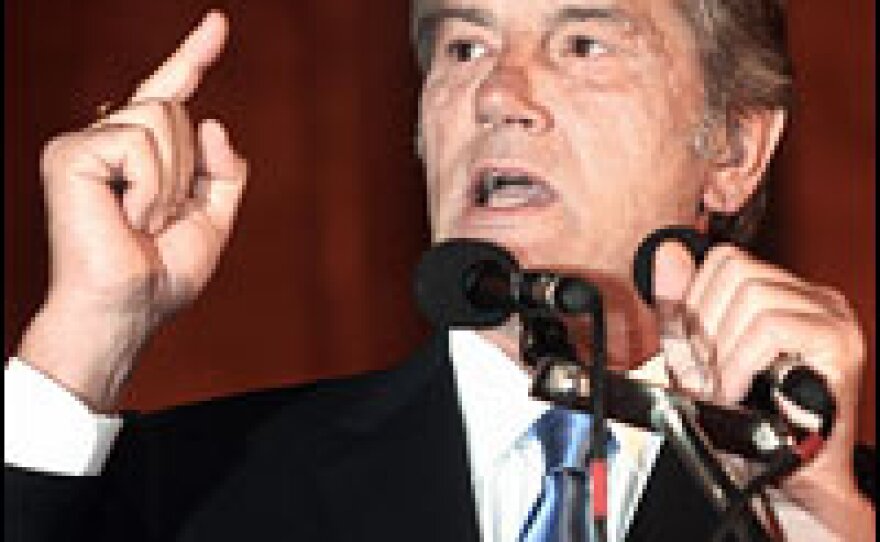
As NATO meets to consider a response to Russia's military actions in Georgia, there is renewed attention on another former Soviet republic that's also on Russia's radar: Ukraine.
Some Ukrainians fear that they could be next in a Russian drive to reassert control over the nations on its borders. The U.S. backs Georgia and Ukraine for membership in the alliance, a move that Russia and some other NATO members firmly oppose.
The conflict in Georgia resonates particularly strongly in Ukraine. The two nations have some key problems in common, including internal political divisions, separatist issues and uneasy relations with Russia. But analysts note that they have important differences as well, and say that each country will have to recalibrate its own relationship with Russia.
Ukraine's president has come out strongly in support of Georgia. President Viktor Yushchenko joined with leaders from Estonia, Latvia, Lithuania and Poland at a rally in support of the Georgian government in Tbilisi. He also angered Moscow by seeking to impose controls on the movement of Russian vessels based in Ukraine's Crimea region.
Ukrainians Debate Support For Georgia
Support for Georgia has become a focus of internal dissention in Ukraine. Yushchenko has accused his main political rival, Prime Minister Yulia Tymoshenko, of withholding support for Georgia in a bid to gain Russia's support in presidential elections in 2010.
Tymoshenko and her party have called for an end to the fighting in Georgia, but stopped short of criticizing Russia's role there. A spokesman for Tymoshenko called the president's comments "hysterical" and said it's a sign he's starting his re-election campaign early.
Like Georgia's president Mikhail Saakashvili, Yushchenko is seeking NATO membership for his country — a move Moscow fiercely opposes, saying it would extend a potentially hostile military alliance along Russia's borders.
At a NATO meeting in April, Germany, France and Italy said that neither Ukraine nor Georgia is ready to take the first step toward NATO membership, but the alliance promised that the two nations would eventually be able to join. German Chancellor Angela Merkel reinforced that promise during a visit to Tbilisi on Sunday but was no more specific about when it might happen.
NATO Membership Bids Stir Divisions
Lithuania and Poland, both NATO members, urged alliance foreign ministers to consider accelerated membership for Georgia and Ukraine at Tuesday's meeting in Brussels, saying the crisis in Georgia shows that both countries need NATO protection from Russia.
But that's precisely why NATO ministers may be even more hesitant to consider membership for the two nations, reasoning that the alliance might not be able to prevent the fledgling members from provoking a fight with Russia and wouldn't be able to defend them if they did.
There's resistance to NATO membership within Ukraine, as well. It's concentrated among Ukraine's Russian-speaking population in the country's east and south.
Steven Pifer, a visiting fellow at the Brookings Institution, says divisions between Ukraine's Russian- and Ukrainian-speaking populations are not nearly as significant as the ethnic separatism that plagues Georgia, and probably couldn't be used by Russia as leverage against Ukraine's government.
Pifer, a former U.S. ambassador to Ukraine, notes that Ukraine does have a potential separatist issue in Crimea, its narrowly connected peninsula in the Black Sea, but says that problem has been largely diffused by giving the region near autonomy. Pifer says Ukraine and its international supporters should be wary of any Russian efforts to revive separatist feelings in Crimea.
A Bolder Russia?
Some Georgian officials, such as former President Eduard Shevardnadze, have suggested that if Russia is not challenged on its actions in Georgia, it will be emboldened to move against Ukraine next.
Andrei Kamenshikov, a representative of Nonviolence International in the Caucasus region, says that's unlikely. He points out that, unlike Georgia, Ukraine is a large country with a population of some 46 million, with a military of more than 200,000. Russia, he says, "doesn't have the means to do anything in Ukraine like it has in Georgia."
Pifer says the U.S. should now do two things: first, impress on Ukrainian leaders that they need to stop their own political infighting. He says disunity between President Yushchenko and Prime Minister Tymoshenko is a key reason why Ukraine didn't get a membership action plan from NATO.
Secondly, Pifer says the U.S. should look for ways to reassure Yushchenko that he still has American support, such as a well-publicized meeting with a senior American official.
Copyright 2022 NPR. To see more, visit https://www.npr.org. 9(MDAzMjM2NDYzMDEyMzc1Njk5NjAxNzY3OQ001))





